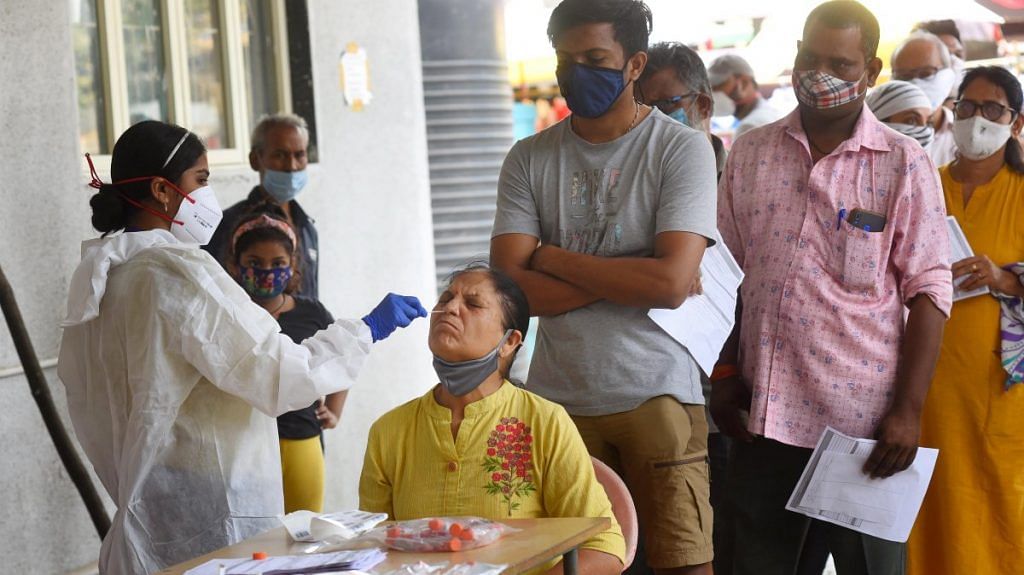Mumbai: Hoping to cut its reliance on external sources for oxygen supply amid a severe shortage, the Mumbai civic body plans to set up 16 oxygen manufacturing plants across 12 hospitals in the city at a cumulative cost of Rs 90 crore.
With this, the Brihanmumbai Municipal Corporation (BMC) hopes to generate 43 metric tonne oxygen per day. Mumbai currently needs anywhere between 250 and 260 metric tonne of oxygen a day.
P. Velarusu, additional municipal commissioner at the BMC, told ThePrint, “We invited tenders about four days ago and should be able to give work orders in the next ten days.”
“After that, it should not take more than 20-25 days for the plants to be functional. So, the entire process will take a little over a month.”
“As per scientific models, we are expecting the current wave to peak by the middle of next month. Our idea of having our own oxygen plants is that it is risky to rely on outside sources. This will reduce our dependence to a certain extent,” he added.
The 12 hospitals include all major civic body-run hospitals such as King Edward Memorial Hospital, Nair Hospital, Sion Hospital, Cooper Hospital, and Shatabdi Hospital. Some of the plants will also be installed at the Jumbo Covid care facilities, which are the field hospitals that the BMC has set up to increase Covid beds.
According to the BMC, the plants will have a minimum life of 15 years and a maximum of 30 years.
The BMC already has two such plants operational — one at Kasturba Hospital in Chinchpokli installed two years ago and the second at Jogeshwari trauma care facility, which was installed a year ago.
All the plants will run on a pressure swing absorption technology under which atmospheric air is first compressed and then purified to remove any impure particles such as dust, fuel or oil particles. The plant then separates the nitrogen from the oxygen, which is stored in an appropriate concentration, and then supplied to patients through a pipe.
Also read: Maharashtra reports new single-day high of 68,631 Covid cases, Mumbai alone has 8,468
Oxygen shortage
Last week, there were two incidents in Mumbai where the hospitals suddenly fell short of oxygen, endangering patients’ lives.
On 18 April, the BMC had to shift 168 patients, including 40 who were in a critical condition, from six civic body-run hospitals overnight to other hospitals due to a severe shortage of oxygen.
Then on 21 April, a private hospital in Ghatkopar informed the BMC that it had oxygen left to last only for the next 1.5 hours. Sixty-one patients were on oxygen support. The civic body had to scramble for oxygen and supply it to the hospital to avert a disaster.
“Last week, there were some issues because of shortage in the supply of oxygen. We were getting about 210 metric tonne when our requirement daily is 250-260 metric tonne. But, the state government has now identified a plant in the Raigad district to bridge that shortfall for us,” Velarusu said.
“For now the situation is under control, but we don’t want to run the risk of fully depending on outside sources. The oxygen plants will help,” he added.
Covid-battered Mumbai
Mumbai has been one of the major Covid hotspots in the first as well as the second wave.
The city has so far recorded 6,16,221 Covid cases, of which 81,538 were active as of Friday. On Friday, Mumbai recorded 7,221 new Covid cases.
As of Friday, 916, which is 8.3 per cent of the total 10,981 oxygen beds in the city’s Covid facilities, were vacant.
(Edited by Debalina Dey)
Also read: Covid has hit Mumbai’s urban affluent the most
